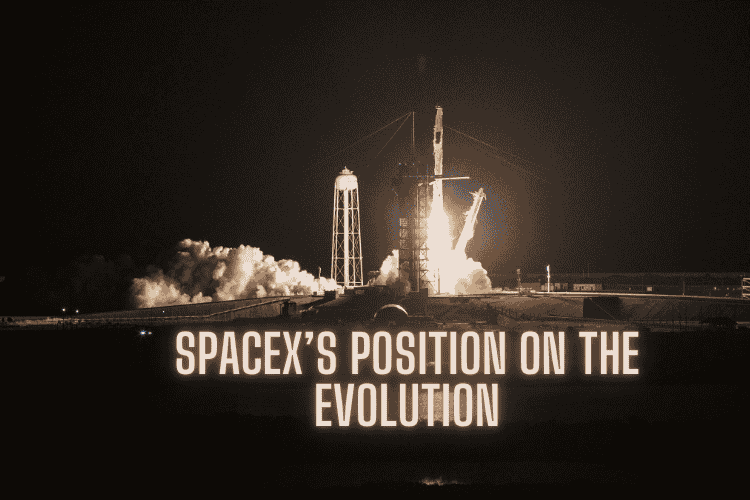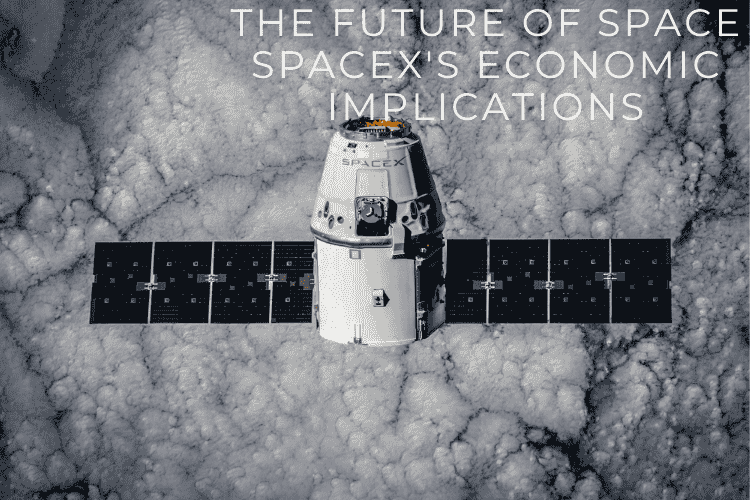Hello people! How exactly will SpaceX impact the economy of our future space endeavors?
What used to be the preserve of mainly government institutions and only a few specialized industries has suddenly morphed into a sector that is now experiencing private capital and interest inflows. Moreover, companies like SpaceX have contributed to this expansion through their reusable rockets, the mission to Mars, and cheap satellite launches.
Just as SpaceX revolutionizes the fields of space exploration and communication, it also helps comprehend the economic consequences of P-Space to predict its possible impact on the global economy, job creation, and even global politics..
The Future of Space: SpaceX’s Economic Implications
SpaceX’s Position on the Evolution

Created by Elon Musk in 2002, SpaceX was set up with the mission of becoming the pioneering company in space exploration, thus introducing better efficiency.
Reusable rockets and superior launch operations have greatly reduced the price of launches to nearly 40% reduction from traditional government-induced missions.
Research from Morgan Stanley found that SpaceX is now worth over $137 billion and says it has the potential to change the world economy.
Decreased Cost and Gaining Access to Space
A major value that SpaceX has brought to the gaming industry is the dramatic lowering of the cost of getting to space. Earlier, government bodies such as NASA used to spend hundreds of millions solely for a launch, and their rockets were designed for one-time use only, making the mission tens of millions of dollars costlier.
SpaceX’s Falcon 9 rockets are reusable, which contrasts with Virgin Galactic’s approach and has brought launch costs down to about $62 million –the cheapest.
Such affordability opens up a realm of possibilities: countries that in the past could depend on recognized space programs can now create one on their own.
However, many newcomer countries like Lithuania, Hungary, and the United Arab Emirates have launched satellite and exploration programs due to SpaceX’s affordable price and quick turnaround time.
Employment Opportunities and the Space Employment Population
The opportunities for domestic or foreign skilled labor within the space industry are on the rise. Currently, SpaceX has a workforce of more than 12000, and as its impact rises, the jobs for engineers, scientists, technologists, and other technical staff are expected to go up all over the world. Despite its relative stability, the aerospace engineering field is said to be growing by 6% in the next decade by the U.S. Bureau of Labor Statistics than many other fields. Others, realizing the value of an educated human capital for its economy, are also investing in education to develop fresh talents of space workers.
In addition, the space industry had the potential to foster employment in areas unrelated to aircraft manufacture and operation, such as Telecommunications, manufacturing, and robotics industries. Thus, as tourism, satellite technology, and other non-terrestrial travel and exploration increase, the need for qualified workers in other chains that are not considered space-related may increase in a sector.
The Star-link Project A means for Internet Advancement
Starlink, SpaceX, a commercial satellite internet project, evaluates the economic opportunities of commercial satellite constellations. Built to deliver internet speeds with minimal latency to regions that lack access to broadband connectivity, Starlink currently has over 4000 satellites and plans to put up 42000 satellites by the middle of the ‘20s.
The Internet, specifically, is involved in achieving economic benefits in a direct sense, where the benefit is felt more in developing countries. The World Bank said that for every 10% boost in broadband usage, developing nations can experience a 1.2% rise in their Gross Domestic Product. As SpaceX deploys Starlink to reach those in distant and untapped locations, the service could spur economies and provide education and jobs, and innovative technologies could help with social equity on a global level.
Advancing Space Tourism A New Luxury Market
One dream now seems closer to reality—that of space tourism.According to market analysis, this market could reach nearly 3 billion in space tourism by 2030. Other companies such as Blue Origin and Virgin Galactic are entering the race too, so this could mean that competition would further increase its other push down its- drive toward making the costs more reasonable in the future and growing market accessibility.
These ventures could introduce space as a more accessible, tangible reality that might bring investment into spaceports, training centers, and other facilities as means to deliver economic advantages to the local population and create numerous opportunities for thousands of people in tourism, transport, and education fields.
Mars Mission and Its Economic Benefit
Though ambitious enough, this goal might create a frontier for expanding the economy. A Martian colony would have to use many resources and a Mars–focused export would be agricultural business, mining, and manufacturing, taking care of the needs of life on Mars.
The economy of space colonization implies that there will be so much demand for products that will support space-borne logistics, rocket fuel, solar power, and others.
If there were an ’economy’ on Mars, then the combination of governments and private companies would have to work together to support such an economy – which would be based mainly on trade between planets and moons and other celestial bodies. The venture could potentially create trillions of new economics – mostly if and when man ventures into space.
SpaceX and International Relations of Space

This is because as private space companies become global players, they could alter international relations, given their economic impact. SpaceX works with a number of national space agencies, offering satellite servicing and support to countries that need to possess the capability to create their programs for the exploration of outer space.
Cooperation in space technology is now rewriting the rules of geopolitics, and space technology could be a power factor in collaboration or confrontation.
That is another political economy, given that SpaceX also offers global services like satellite internet.
In some politically unstable regions or where internet freedom is limited in its essence, Starlink has offered an interoperable digital structure. For Instance, during the conflict in Ukraine, Starlink, provided by SpaceX, enabled the Ukrainian forces to continue communicating despite network disruptions, even if it had political and economic implications in areas of conflict.
Weaknesses of SpaceX and Its Economic Strategy
At the same time, there is a realization that SpaceX may be driving growth in the space economy, but there are issues or concerns.
Some people have accused SpaceX of increasing the threats of space collisions since the company moves fast and launches satellites into orbit. ESA’s report suggests that over 370 million larger items bigger than 10cm are floating in space, and thousands are smaller items that may pose a space hazard.
Some of the changes include the environmental advocacy against the carbon footprints of more frequent rocket launches.
While using reusable rockets helps to cut costs and waste, fuel emissions are still a problem, and there are demands for sustainability within the space field. So, as SpaceX and its competitors progress their businesses, a sustainable marriage between economy and space assets will be an existential goal.
Future Economic Implications New Frontiers for Investment
As SpaceX expands its capabilities, the entire space sector is evolving into a more appealing investment terrain. VC firms are funding space tech companies, with $17 billion being invested in private space companies this year.
According to Deloitte, international space infrastructure investment, including satellite internet service, space mining, and space travel, could be above $2.5 trillion by 2050.
The need for new sources of revenue has shifted firms from the initial focus of space—aerospace sectors—to advanced industries such as asteroid mining, solar energy, and data gathering. SpaceX shows that people are willing to purchase space-relevant merchandise and services, thus providing even more incentives for capital expenditure in the space sector and business creation in the new space economy.
Conclusion
Some of its operations have fiscal repercussions that extend far beyond the issue of lowered rocket launch costs. From cheap satellite internet and the reassignment of jobs globally to potential industries such as space tourism and Mars colonization, SpaceX is the harbinger of change in the economy.
With people such as Elon Musk taking private companies into the future, the economic benefits of space are more obvious than ever. But when growth hits the organization’s roof, there is always the added responsibility. Pro degrees of innovation and efficiency, sustainable costs, and international cooperation will become paramount when people push further into the cosmos.
Will SpaceX innovations remain a key force in expanding economic enterprise beyond Earth’s perimeters?
FAQs
- What is the role of SpaceX in the current space economy?
SpaceX has changed the way space launches are conducted as a service, making them cheaper and opening up fields such as satellite internet, adventurers, and scientists.
- What effects does Starlink have on the economies of the world?
Starlink offers internet in several areas that need more access to the services required to advance their economies through education and employment, among other things.
- What economic benefits might the colonization of Mars have for humanity?
Cognitive creation: The occupation of Mars may create new opportunities for new markets such as space farming, space mining, and interplanetary commerce, which may imply trillions of dollars in space-based economic activities in a future where people move from Earth Earth to other planets.
- What are the risks of the SpaceX organization’s growth?
Some problems emerging for SpaceX include issues with space debris and rocket emissions into space.





